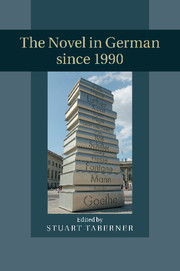Book contents
- Frontmatter
- Contents
- Contributors
- Acknowledgements
- Introduction: The novel in German since 1990
- Chapter 1 Robert Schindel???s Geb??rtig (Born-Where)
- Chapter 2 G??nter Grass???s Ein weites Feld (Too Far Afield)
- Chapter 3 Thomas Brussig???s Helden wie wir (Heroes Like Us)
- Chapter 4 Christa Wolf???s Medea. Stimmen (Medea. A Modern Retelling)
- Chapter 5 Zafer ??enocak???s Gef??hrliche Verwandtschaft (Perilous Kinship)
- Chapter 6 Monika Maron???s Endmor??nen (End Moraines)
- Chapter 7 Martin Walser???s Ein springender Brunnen (A Gushing Fountain)
- Chapter 8 Michael Kleeberg???s Ein Garten im Norden (A Garden in the North)
- Chapter 9 Christian Kracht???s Faserland (Frayed-Land)
- Chapter 10 Elfriede Jelinek???s Gier (Greed)
- Chapter 11 Karen Duve???s Dies ist kein Liebeslied (This Is Not a Love-Song)
- Chapter 12 Herta M??ller???s Herztier (The Land of Green Plums)
- Chapter 13 W. G. Sebald???s Austerlitz
- Chapter 14 Walter Kempowski???s Alles umsonst (All for Nothing)
- Chapter 15 F. C. Delius???s Mein Jahr als M??rder (My Year as a Murderer)
- Chapter 16 Yad?? Kara???s Selam Berlin
- Chapter 17 Daniel Kehlmann???s Die Vermessung der Welt (Measuring the World)
- Chapter 18 G??nter Grass???s Beim H??uten der Zwiebel (Peeling the Onion)
- Select bibliography
- Index
- References
Chapter 15 - F. C. Delius???s Mein Jahr als M??rder (My Year as a Murderer)
Published online by Cambridge University Press: 07 September 2011
- Frontmatter
- Contents
- Contributors
- Acknowledgements
- Introduction: The novel in German since 1990
- Chapter 1 Robert Schindel???s Geb??rtig (Born-Where)
- Chapter 2 G??nter Grass???s Ein weites Feld (Too Far Afield)
- Chapter 3 Thomas Brussig???s Helden wie wir (Heroes Like Us)
- Chapter 4 Christa Wolf???s Medea. Stimmen (Medea. A Modern Retelling)
- Chapter 5 Zafer ??enocak???s Gef??hrliche Verwandtschaft (Perilous Kinship)
- Chapter 6 Monika Maron???s Endmor??nen (End Moraines)
- Chapter 7 Martin Walser???s Ein springender Brunnen (A Gushing Fountain)
- Chapter 8 Michael Kleeberg???s Ein Garten im Norden (A Garden in the North)
- Chapter 9 Christian Kracht???s Faserland (Frayed-Land)
- Chapter 10 Elfriede Jelinek???s Gier (Greed)
- Chapter 11 Karen Duve???s Dies ist kein Liebeslied (This Is Not a Love-Song)
- Chapter 12 Herta M??ller???s Herztier (The Land of Green Plums)
- Chapter 13 W. G. Sebald???s Austerlitz
- Chapter 14 Walter Kempowski???s Alles umsonst (All for Nothing)
- Chapter 15 F. C. Delius???s Mein Jahr als M??rder (My Year as a Murderer)
- Chapter 16 Yad?? Kara???s Selam Berlin
- Chapter 17 Daniel Kehlmann???s Die Vermessung der Welt (Measuring the World)
- Chapter 18 G??nter Grass???s Beim H??uten der Zwiebel (Peeling the Onion)
- Select bibliography
- Index
- References
Summary
Friedrich Christian Delius’s novel Mein Jahr als Mörder (My Year as a Murderer, 2004) is one of a number of post-1990 German-language narratives and films that deal with the question of German resistance to the Third Reich. The novel cross-stitches the reconstruction of the activities of a small and largely unknown resistance group which went by the name of the ‘European Union’ with a restrospective account of the student movement of 1968 and its attitude to the victims of National Socialism. Delius’s examination of 1968 as a significant lieu de mémoire in contemporary Germany is motivated, on the one hand, by his own generational affiliation and, on the other, by the debate about the contribution of 1968 to the liberalisation of West German society. The narrative therefore not only scrutinises various public expressions of the revolutionary zest of the student movement, but also homes in on the ’68ers’ personal sphere by relating the love story between the protagonist and Catherine. Their relationship is, as we will see, affected by the political debates and ideological battles of the time.
The story is told by a former member of the student movement who, after the acquittal of a former Nazi judge by a West German court, decides to take matters into his own hands and to assassinate the judge for his service on the infamous Volksgerichtshof (‘people’s court’), the judicial wing of the National Socialist state which sentenced thousands of resisters and ordinary Germans to death. By telescoping a forgotten story of left-wing resistance through the eyes of a former ’68er, the narrative examines the divided memory cultures in East and West Germany in the postwar period as well as the ideological myopia of the generation of ’68, which had little sympathy for or interest in the real victims of National Socialism because its members saw themselves as the primary victims of their parents’ guilt for the Third Reich. Before offering a reading of Delius’s Mein Jahr als Mörder, it is necessary to briefly discuss the divided memory cultures in the two Germanys through the lens of the historical debate on German resistance, as this issue features prominently in the novel.
- Type
- Chapter
- Information
- The Novel in German since 1990 , pp. 226 - 240Publisher: Cambridge University PressPrint publication year: 2011



